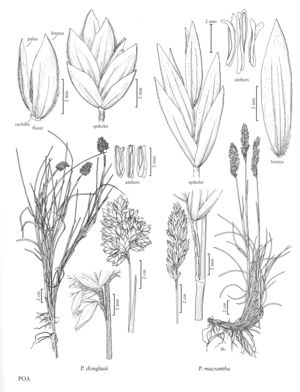Difference between revisions of "Poa macrantha"
FNA>Volume Importer |
imported>Volume Importer |
||
| (8 intermediate revisions by 2 users not shown) | |||
| Line 4: | Line 4: | ||
|publications= | |publications= | ||
|common_names=Dune bluegrass | |common_names=Dune bluegrass | ||
| + | |special_status={{Treatment/ID/Special_status | ||
| + | |code=E | ||
| + | |label=Endemic | ||
| + | }} | ||
|basionyms= | |basionyms= | ||
|synonyms={{Treatment/ID/Synonym | |synonyms={{Treatment/ID/Synonym | ||
|name=Poa douglasii subsp. macrantha | |name=Poa douglasii subsp. macrantha | ||
| − | |authority= | + | |authority= |
| + | |rank=subspecies | ||
}} | }} | ||
|hierarchy=Poaceae;Poaceae subfam. Pooideae;Poaceae tribe Poeae;Poa;Poa subg. Poa;Poa sect. Madropoa;Poa subsect. Madropoa;Poa macrantha | |hierarchy=Poaceae;Poaceae subfam. Pooideae;Poaceae tribe Poeae;Poa;Poa subg. Poa;Poa sect. Madropoa;Poa subsect. Madropoa;Poa macrantha | ||
| Line 20: | Line 25: | ||
-->{{Treatment/Body | -->{{Treatment/Body | ||
|distribution=Oreg.;Alaska;Calif.;Wash.;B.C. | |distribution=Oreg.;Alaska;Calif.;Wash.;B.C. | ||
| − | |discussion=<p>Poa macrantha is a dioecious coastal sand dune species that grows from southern Alaska to northern California. It competes better than P. douglasii (see previous) with the invasion of its habitat by Ammophila and other exotic species. It used to be treated as a subspecies of P. douglasii; a few intermediates with that species have been found around the mouth of Little River, California. Although clearly related, the two species are reasonably divergent in a number of characters. Poa macrantha is readily distinguished from P. douglasii by its glabrous rachises and usually longer glumes and lemmas.</p> | + | |discussion=<p><i>Poa macrantha</i> is a dioecious coastal sand dune species that grows from southern Alaska to northern California. It competes better than <i>P. douglasii</i> (see previous) with the invasion of its habitat by <i>Ammophila</i> and other exotic species. It used to be treated as a subspecies of <i>P. douglasii</i>; a few intermediates with that species have been found around the mouth of Little River, California. Although clearly related, the two species are reasonably divergent in a number of characters. <i>Poa macrantha</i> is readily distinguished from <i>P. douglasii</i> by its glabrous rachises and usually longer glumes and lemmas.</p> |
|tables= | |tables= | ||
|references= | |references= | ||
| Line 29: | Line 34: | ||
-->{{#Taxon: | -->{{#Taxon: | ||
name=Poa macrantha | name=Poa macrantha | ||
| − | |||
|authority=Vasey | |authority=Vasey | ||
|rank=species | |rank=species | ||
| Line 36: | Line 40: | ||
|basionyms= | |basionyms= | ||
|family=Poaceae | |family=Poaceae | ||
| + | |illustrator=Sandy Long | ||
| + | |illustration copyright=Utah State University | ||
|distribution=Oreg.;Alaska;Calif.;Wash.;B.C. | |distribution=Oreg.;Alaska;Calif.;Wash.;B.C. | ||
|reference=None | |reference=None | ||
|publication title= | |publication title= | ||
|publication year= | |publication year= | ||
| − | |special status= | + | |special status=Endemic |
| − | |source xml=https:// | + | |source xml=https://bitbucket.org/aafc-mbb/fna-data-curation/src/200273ad09963decb8fc72550212de541d86569d/coarse_grained_fna_xml/V24/V24_771.xml |
|subfamily=Poaceae subfam. Pooideae | |subfamily=Poaceae subfam. Pooideae | ||
|tribe=Poaceae tribe Poeae | |tribe=Poaceae tribe Poeae | ||
Latest revision as of 17:25, 11 May 2021
Plants perennial; loosely tufted, rhizomatous and stoloniferous, rhizomes and stolons to 4 m, stout, robust. Basal branching mostly intravaginal, some extravaginal. Culms (7)15-60 cm tall, 1.5-2 mm thick, bases decumbent, terete or weakly compressed, smooth or moderately scabrous below the panicles; nodes terete, 0(1) exserted. Sheaths closed for about 1/2 their length, terete, glabrous or sparsely retrorsely scabrous, bases of basal sheaths glabrous, distal sheath lengths 1.7-4(6) times blade lengths; collars smooth, glabrous; ligules 1-5 mm, scabrous, truncate to acute, ciliolate; innovation blades to 30 cm, moderately to densely scabrous or hispidulous on and between the veins; cauline blades subequal in length, 2-4 mm wide, involute, thick, somewhat arcuate, firm, abaxial surfaces smooth or moderately to densely scabrous or hispidulous on and between the veins, apices narrowly prow-shaped, flag leaf blades 1-10 cm. Panicles 3-15 cm, erect, ovoid to lanceolate, contracted, often interrupted, congested, with 15-80 spikelets, rachises glabrous, smooth to moderately scabrous; nodes with 1-2 branches; branches 1-6 cm, erect, stiff, terete to weakly angled, smooth or sparsely to moderately scabrous, with 3-17 spikelets. Spikelets 9-17 mm, lengths to 3 times widths, laterally compressed, not sexually dimorphic; florets 3-6(10); rachilla internodes smooth, usually hairy, hairs 0.3-0.4+ mm, rarely glabrous. Glumes broadly lanceolate, subequal to the adjacent lemmas, distinctly keeled, keels sparsely scabrous near the apices; lower glumes 3-veined; upper glumes usually 7+ mm, 3-5-veined; calluses usually with a crown of hairs, sometimes glabrous or diffusely webbed; lemmas (6)7.5-11 mm, lanceolate, 5-7(11)-veined, distinctly keeled, keels and marginal veins, and sometimes the lateral veins, short-villous to softly puberulent, intercostal regions smooth or scabrous, glabrous or softly puberulent, margins glabrous, apices acute; palea keels scabrous, intercostal regions glabrous; anthers vestigial (0.1-0.2 mm) or (2)3-4(5) mm. 2n = 28.
Distribution
Oreg., Alaska, Calif., Wash., B.C.
Discussion
Poa macrantha is a dioecious coastal sand dune species that grows from southern Alaska to northern California. It competes better than P. douglasii (see previous) with the invasion of its habitat by Ammophila and other exotic species. It used to be treated as a subspecies of P. douglasii; a few intermediates with that species have been found around the mouth of Little River, California. Although clearly related, the two species are reasonably divergent in a number of characters. Poa macrantha is readily distinguished from P. douglasii by its glabrous rachises and usually longer glumes and lemmas.
Selected References
None.
